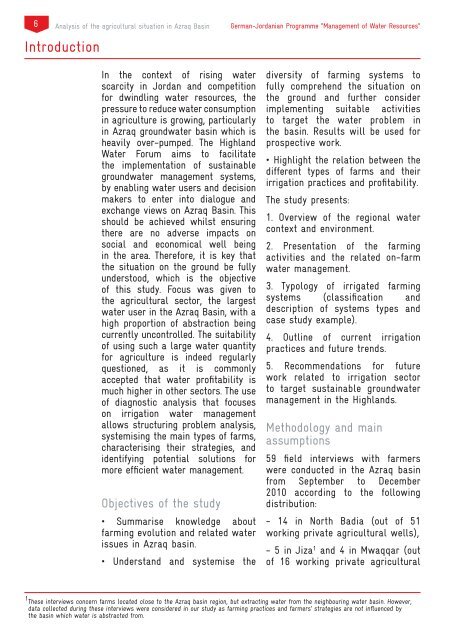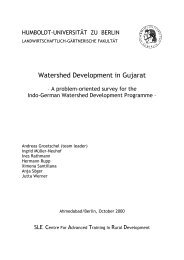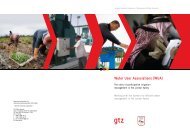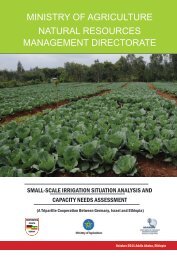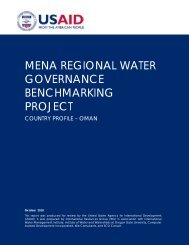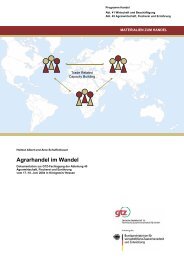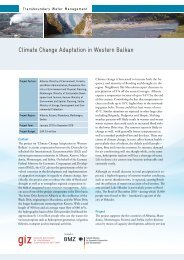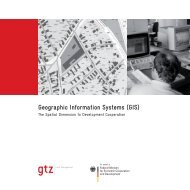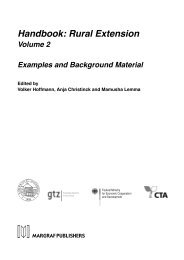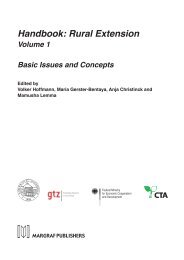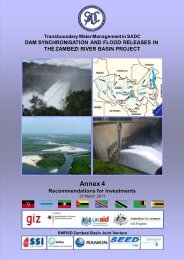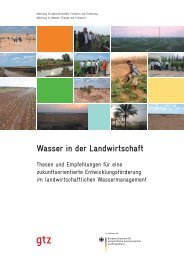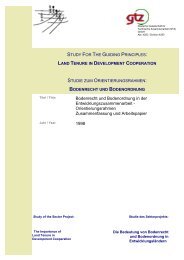Farming in the - WordPress.com
Farming in the - WordPress.com
Farming in the - WordPress.com
You also want an ePaper? Increase the reach of your titles
YUMPU automatically turns print PDFs into web optimized ePapers that Google loves.
Analysis of <strong>the</strong> agricultural situation <strong>in</strong> Azraq Bas<strong>in</strong><br />
Introduction<br />
German-Jordanian Programme “Management of Water Resources”<br />
In <strong>the</strong> context of ris<strong>in</strong>g water<br />
scarcity <strong>in</strong> Jordan and <strong>com</strong>petition<br />
for dw<strong>in</strong>dl<strong>in</strong>g water resources, <strong>the</strong><br />
pressure to reduce water consumption<br />
<strong>in</strong> agriculture is grow<strong>in</strong>g, particularly<br />
<strong>in</strong> Azraq groundwater bas<strong>in</strong> which is<br />
heavily over-pumped. The Highland<br />
Water Forum aims to facilitate<br />
<strong>the</strong> implementation of susta<strong>in</strong>able<br />
groundwater management systems,<br />
by enabl<strong>in</strong>g water users and decision<br />
makers to enter <strong>in</strong>to dialogue and<br />
exchange views on Azraq Bas<strong>in</strong>. This<br />
should be achieved whilst ensur<strong>in</strong>g<br />
<strong>the</strong>re are no adverse impacts on<br />
social and economical well be<strong>in</strong>g<br />
<strong>in</strong> <strong>the</strong> area. Therefore, it is key that<br />
<strong>the</strong> situation on <strong>the</strong> ground be fully<br />
understood, which is <strong>the</strong> objective<br />
of this study. Focus was given to<br />
<strong>the</strong> agricultural sector, <strong>the</strong> largest<br />
water user <strong>in</strong> <strong>the</strong> Azraq Bas<strong>in</strong>, with a<br />
high proportion of abstraction be<strong>in</strong>g<br />
currently uncontrolled. The suitability<br />
of us<strong>in</strong>g such a large water quantity<br />
for agriculture is <strong>in</strong>deed regularly<br />
questioned, as it is <strong>com</strong>monly<br />
accepted that water profitability is<br />
much higher <strong>in</strong> o<strong>the</strong>r sectors. The use<br />
of diagnostic analysis that focuses<br />
on irrigation water management<br />
allows structur<strong>in</strong>g problem analysis,<br />
systemis<strong>in</strong>g <strong>the</strong> ma<strong>in</strong> types of farms,<br />
characteris<strong>in</strong>g <strong>the</strong>ir strategies, and<br />
identify<strong>in</strong>g potential solutions for<br />
more efficient water management.<br />
Objectives of <strong>the</strong> study<br />
• Summarise knowledge about<br />
farm<strong>in</strong>g evolution and related water<br />
issues <strong>in</strong> Azraq bas<strong>in</strong>.<br />
• Understand and systemise <strong>the</strong><br />
diversity of farm<strong>in</strong>g systems to<br />
fully <strong>com</strong>prehend <strong>the</strong> situation on<br />
<strong>the</strong> ground and fur<strong>the</strong>r consider<br />
implement<strong>in</strong>g suitable activities<br />
to target <strong>the</strong> water problem <strong>in</strong><br />
<strong>the</strong> bas<strong>in</strong>. Results will be used for<br />
prospective work.<br />
• Highlight <strong>the</strong> relation between <strong>the</strong><br />
different types of farms and <strong>the</strong>ir<br />
irrigation practices and profitability.<br />
The study presents:<br />
1. Overview of <strong>the</strong> regional water<br />
context and environment.<br />
2. Presentation of <strong>the</strong> farm<strong>in</strong>g<br />
activities and <strong>the</strong> related on-farm<br />
water management.<br />
3. Typology of irrigated farm<strong>in</strong>g<br />
systems (classification and<br />
description of systems types and<br />
case study example).<br />
4. Outl<strong>in</strong>e of current irrigation<br />
practices and future trends.<br />
5. Re<strong>com</strong>mendations for future<br />
work related to irrigation sector<br />
to target susta<strong>in</strong>able groundwater<br />
management <strong>in</strong> <strong>the</strong> Highlands.<br />
Methodology and ma<strong>in</strong><br />
assumptions<br />
59 field <strong>in</strong>terviews with farmers<br />
were conducted <strong>in</strong> <strong>the</strong> Azraq bas<strong>in</strong><br />
from September to December<br />
2010 accord<strong>in</strong>g to <strong>the</strong> follow<strong>in</strong>g<br />
distribution:<br />
- 14 <strong>in</strong> North Badia (out of 51<br />
work<strong>in</strong>g private agricultural wells),<br />
- 5 <strong>in</strong> Jiza 1 and 4 <strong>in</strong> Mwaqqar (out<br />
of 16 work<strong>in</strong>g private agricultural<br />
1 These <strong>in</strong>terviews concern farms located close to <strong>the</strong> Azraq bas<strong>in</strong> region, but extract<strong>in</strong>g water from <strong>the</strong> neighbour<strong>in</strong>g water bas<strong>in</strong>. However,<br />
data collected dur<strong>in</strong>g <strong>the</strong>se <strong>in</strong>terviews were considered <strong>in</strong> our study as farm<strong>in</strong>g practices and farmers’ strategies are not <strong>in</strong>fluenced by<br />
<strong>the</strong> bas<strong>in</strong> which water is abstracted from.


